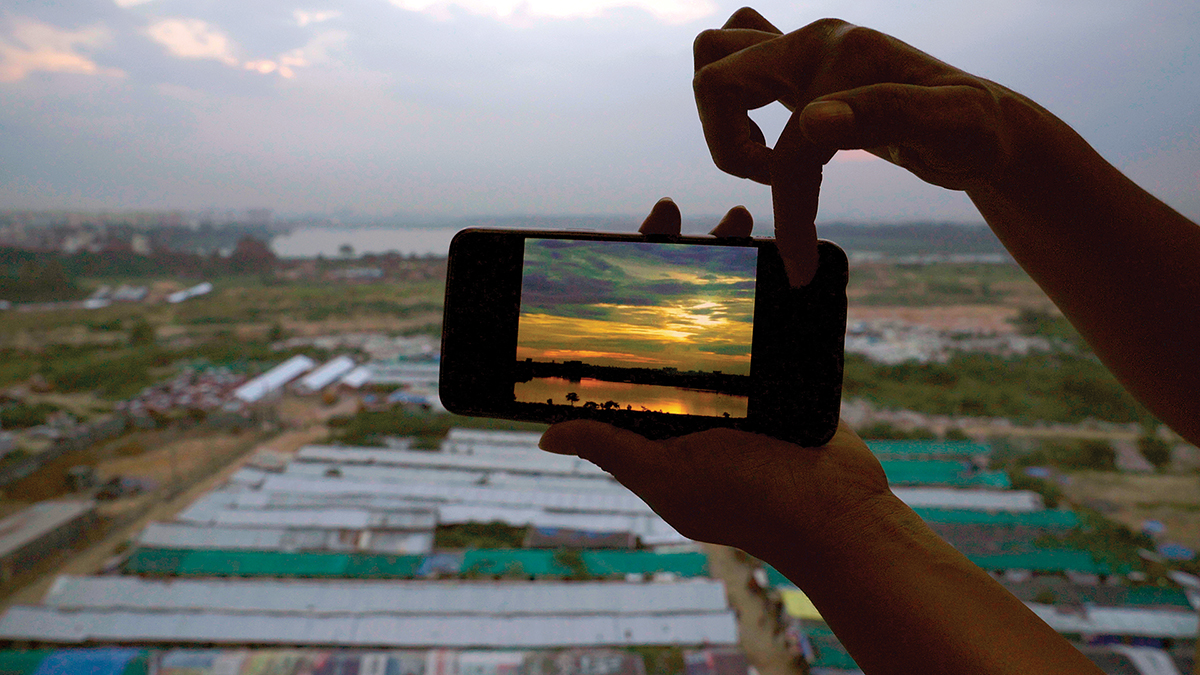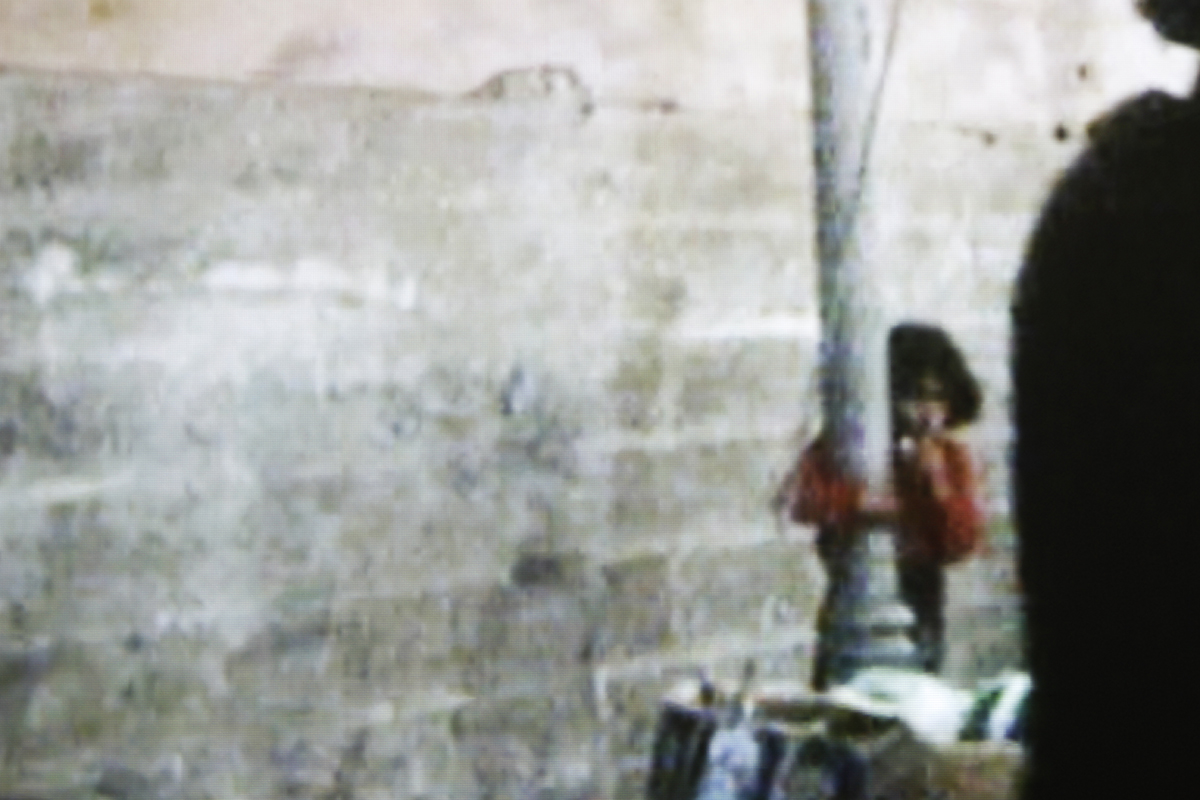The Lake and The Lake / Recollection
Followed by a conversation with Kamal Aljafari
Courtisane is een platform voor film en audiovisuele kunsten. In de vorm van een jaarlijks festival, filmvertoningen, gesprekken en publicaties onderzoeken we de relaties tussen beeld en wereld, esthetiek en politiek, experiment en engagement.
Courtisane is a platform for film and audiovisual arts. Through a yearly festival, film screenings, talks and publications, we research the relations between image and world, aesthetics and politics, experiment and engagement.
Followed by a conversation with Kamal Aljafari

Filmmaker and composer Sindhu Thirumalaisamy spent several years in Bangalore, India, a city that used to be known for its pleasant climate and green spaces. Today, Bangalore’s wetlands are polluted with sewage and waste to such an extent that they produce spectacular foams — in the artist’s words: “bubbles of wealth surrounded by pools of neglect.” The Lake and The Lake responds to a media-driven crisis around these phenomena by offering a representation of one particular lake, Bellandur, as a toxic commons. The lake is toxic in both senses of the word: poisonous to the living beings that inhabit it and high-risk in economic terms. Nevertheless, it remains a space of commoning for various people whose labour sustains the city’s development. Moving through the peripheries of Bellandur lake alongside fishing communities, waste workers, foragers, security guards, street dogs, and children, the question arises: what constitutes a ‘nature’ worth protecting? On the soundtrack, the landscape is washed over with acoustic and acousmatic voices, devotional music, religious speech, jet engines, rifle shooting sessions, children playing, the rhythms of work, the chatter of hundreds of birds and insects. “Like much of my work with ambient sound, these moments are about presence, about dwelling in common...I treat some sounds as residual echoes, mimicking my experience of the music that echoed over the surface of the lake. When music reached me from across the lake, it would be hollowed out with only a faint traces of its melody. I recreate this effect of the sonic residue in some segments of the film, producing an uncanniness that I associate with the lake.”
“Patient frames lead us along the shores where we can examine a square metre of dirt, a posse of lounging dirt dogs, plants whispering in the breeze. The artist traverses the city’s fringe, the liminal edge, as conversations with friends and strangers, experts and neighbours weigh in, along with a bevy of carefully crafted field recordings... In place of a polemic, a broadsheet, or an overview: there is a search. An attuning. A being with. Little surprise that the artist has a sound practice, not only because her tracks are so rich, but because this is a movie that invites us to listen to her listening. Such a deep and unexpected pleasure. As if there was time for that too.” (Mike Holboom)

For many years, Kamal Aljafari has been collecting Israeli and Hollywood fiction films shot in his hometown Jaffa. These are films in which Palestinians are absent, yet they exist at the edges of the frames, visible only in traces and shadows. Further preserved in this archive is a city; its gradual dismantling over the decades chronicled film by film. From the footage of dozens of films, Aljafari has excavated a whole community and recreated the city from his youth, before its destruction by colonization and prior to the settlement projects. “Though out-of-focus, half-glimpsed, I have recognized childhood friends, old people I used to say good evening to as a boy... My uncle. I erased the actors. I photographed the backgrounds and the edges and made the passers-by the main characters of this film. In my film, I find my way from the sea, like in a dream. I walk everywhere, sometimes hesitant and sometimes lost. I wander through the city; I wander through the memories. I film everything I encounter because I know it no longer exists. I return to a lost time.” The spectral politics of Recollection is accentuated by its soundtrack, recorded in collaboration with sound artist Jacob Kirkegaard, which brings to life the ghosts lingering beneath the city surfaces. With the help of contact microphones, vibration sensors and hydrophones, they not only captured the hidden sound layers resonating in the walls but also in the ocean, which for Aljafari symbolizes desire. “The Israeli government and the municipality of Tel Aviv destroyed Jaffa. They threw the homes they destroyed into the sea. But every year, in the winter, when the sea rises, it throws part of these homes back onto the shore. The Tel Aviv municipality collects them, throws them back, but the ruins return. Every year the sea brings them back.”
“In Recollection, freedom is experienced in ‘the sound of the ocean... the echo you can hear outside but recorded from inside the wall. Life buried beneath, inside the sea’. As the images move slowly, other times brusquely, from a silhouette to a shadow, a sliver of the port city of Jaffa to another, the sound moves us into the present unearthing a past. We begin to see the ruins as breathing bodies. We see the place Palestinians have lived in and have been exiled from. And gradually we are brought face-to-face with history, with destruction. The phantoms stare at us. The filmmaker ‘frees the image’, an act he calls ‘cinematic justice’.” (Nathalie Handal)